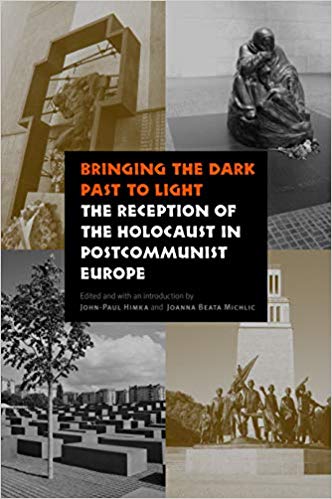Holocaust Supremacism Pushed Internationally Himka

Bringing the Dark Past to Light: The Reception of the Holocaust in PostCommunist Europe, by John-Paul Himka and Joanna Beata Michlic (eds.) 2013
A Prejudicial Orwellian Title. Holocaust Preeminence: A Near-Lament That Eastern Europeans Are Not Buying It!
The only value of this book is the comprehensiveness of its treatment of public reception to the Holocaust throughout Eastern Europe. Otherwise, the reader who is looking for something new, or particularly enlightening, can stop right here. It does not. It treats the Holocaust as self-evidently supreme over all other genocides, and never stops hammering this point into the heads of the many Eastern European peoples.
JEDWABNE WIELDED AS A CLUB AGAINST POLES—YET AGAIN
The editors, John-Paul Himka and Joanna B. Michlic, call on Eastern European nations to have their own “Jedwabne debates”. (p. 9). In addition, Michlic (p. 410), and Omer Bartov (p. 691) misrepresent Polish responsibility, for Jedwabne, as proven fact. It is not. For instance, see JEDWABNE MASSACRE, by Chodakiewicz.
SOME HOLOCAUSTSPEAK: WHOSE DARK PAST?
The phrase–dark past—used in the title of this book, is used in a transparently tendentious, Orwellian manner in reference to Eastern Europeans. There is no mention of the dark past of Jewish conduct in Eastern Europe, except in backwards-bending attempts by the authors to evade it—in a manner that seems to border on intellectual dishonesty.
A very thoughtful approach, to the “dark past” construct, is quoted, albeit dismissively, by Omer Bartov, as follows, “The Paris-based Romanian writer Paul Goma believes reconciliation is possible only if the Jews ‘come to the same table of mutual admission of responsibility, as every other ethnic community’.” (p. 669). Now THAT would be the day!
ARE JEWS SPECIAL? INESCAPABLY, YES
The reader may be astonished, as I was, about the number of nations throughout Eastern Europe that have already been subject to Holocaust supremacist thinking. In fact, much of this book is, quite frankly, a litany of complaints (and even laments) that Eastern Europeans are not generally buying into the notion that Jewish suffering is special and that their own genocides (at the hands of the Nazis and Communists) are secondary. This is notably said of Estonia (p. 202, 668), Latvia (p. 317), Lithuania (p. 327), Poland (pp. 439-440), Russia (p. 488), Slovenia (p. 687), Ukraine (p. 646), etc. On the other hand, specifically-named Eastern Europeans that are Judeocompliant are featured and praised. All this is standard practice.
WARMED-OVER POLONOPHOBIA
In her chapter on Poland, Joanna Beata Michlic dusts off all her mischaracterizations of basic facts, and of scholars not to her liking, that she had presented in her strongly anti-Polish Poland’s Threatening Other: The Image of the Jew from 1880 to the Present.
GERMAN GUILT DIFFUSION AND ITS IMPLICATIONS
Author Bella Zisere quotes Latvian-American historian Andrew Ezergailis, who speaks of the German and Jewish approaches to the Holocaust as ones that involve, in his words, a “Germanless Holocaust” in which locals are blamed. (p. 304). [I find this observation quite perceptive. In fact, in my reviews, I have been using the phrase “de-Germanization of the Nazis.”]
Author John-Paul Himka discusses Babi Yar (Babyn Yar) in Ukraine. Some 100,000 locals, mostly Russians and Ukrainians, had been murdered there by the Germans. Among these 100,000 were 33,771 Jews. (p. 645). Recently, an American Jewish group had wanted to build a memorial to only the Jewish victims. In a manner reminiscent to that of Poles regarding Auschwitz, local Ukrainians objected to the privatization (Holocaust monopolization) of Babi Yar as a site memorializing only the Jewish victims. (p. 646). Bravo, Ukes!
To see a series of truncated reviews in a Category click on that Category:
- All reviews
- Anti-Christian Tendencies
- Anti-Polish Trends
- Censorship on Poles and Jews
- Communization of Poland
- Cultural Marxism
- German Guilt Dilution
- Holocaust Industry
- Interwar Polish-Jewish Relations
- Jewish Collaboration
- Jewish Economic Dominance
- Jews Antagonize Poland
- Jews Not Faultless
- Jews' Holocaust Dominates
- Jews' Holocaust Non-Special
- Nazi Crimes and Communist Crimes Were Equal
- Opinion-Forming Anti-Polonism
- Pogrom Mongering
- Poland in World War II
- Polish Jew-Rescue Ingratitude
- Polish Nationalism
- Polish Non-Complicity
- Polish-Ukrainian Relations
- Polokaust
- Premodern Poland
- Recent Polish-Jewish Relations
- The Decadent West
- The Jew as Other
- Understanding Nazi Germany
- Why Jews a "Problem"
- Zydokomuna